15 of the Best Chinese Idioms – Our Favourites and the Stories Behind Them
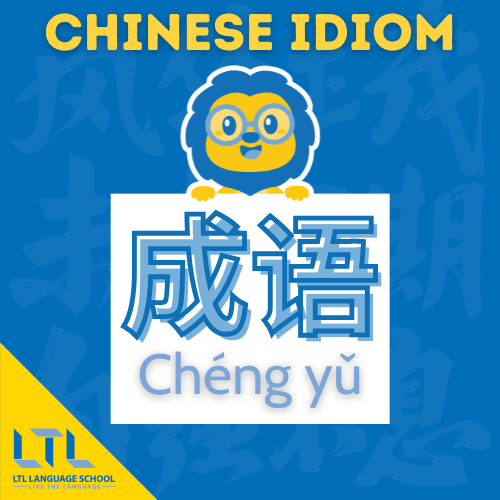
Chinese idioms, or Chengyu, are an integral part of the language, packed with history, wisdom, and charm.
They are often made up of four characters, yet carry profound meanings that convey life lessons, values, and cultural insights.
In this blog, we’ve rounded up 15 of our favourite Chinese idioms, how they came about and example sentences to help you practice.
Slip any of these into a sentence with a native speaker, and they’ll be impressed!
#2 – Armchair Strategist
#5 – Cold Teeth
#6 – Act Decisively
#7 – Firmly Entrenched
#8 – Water Source
#9 – Clap with One Hand
#10 – Flowing Silk
#11 – Blood and Needles
#12 –9 Cows 1 Hair
#13 – Broad Knowledge
#14 – 10,000 Eyes
#15 – Rising Like Steam
Chinese Idiom Story 1: 对牛弹琴 Talking to a Brick Wall
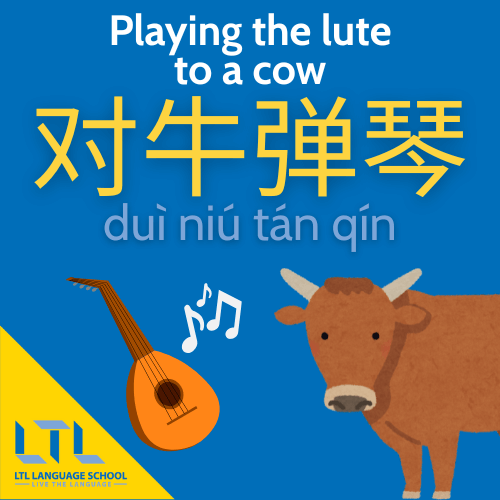
对牛弹琴 (duì niú tán qín) is a Chinese idiom that literally means “playing the lute to a cow.”
It describes a situation where someone is trying to communicate something to an audience that doesn’t understand or appreciate it.
👉 It’s similar to the English expression “talking to a brick wall.”
This idiom comes from a story in which a musician, Gongming Yi, played beautiful music for a cow, but the cow simply kept eating grass, completely unaffected by the performance. Gongming Yi first thought that maybe the cow didn’t like his song, so he changed his tune, but the cow remained uninterested.
It’s often used to describe situations where someone is wasting their effort speaking to people who cannot understand or appreciate their words.
Here’s a breakdown of the characters in this Chengyu:
- 对 duì – towards, at; for; face;
- 牛 niú – ox, cow;
- 弹琴 tánqín – to play or strum a lute or other stringed instrument.
This idiom originates from 牟子理惑论 (Master Mou’s Treatise Dispelling Doubts):
Example Sentences:
别向他解释,那只是对牛弹琴。
Don’t explain it to him; it’s only playing the lute to a cow.跟你说了半天,你一句都不懂,简直是对牛弹琴。
I have been talking to you for a long time, you do not even understand a word. It’s like talking to a brick wall.Looking for more Chinese pearls of wisdom?

How to Learn Chinese Free? Is it Even Possible?
Learn a Language Free? Can I Do This? How to learn Chinese free, is it even possible? You’d be surprised! With the amount of resources out there nowadays, you can absolutely learn Chinese free but you will always have your…
Chinese Idiom Story 2: 纸上谈兵 Armchair Strategist
纸上谈兵 (zhǐ shàng tán bīng) literally means “discussing military strategy on paper.”
It describes someone who only talks about theories without practical experience or relies on empty talk that is impractical in real situations. It’s similar to the English expressions “armchair strategist” or “all talk, no action.”
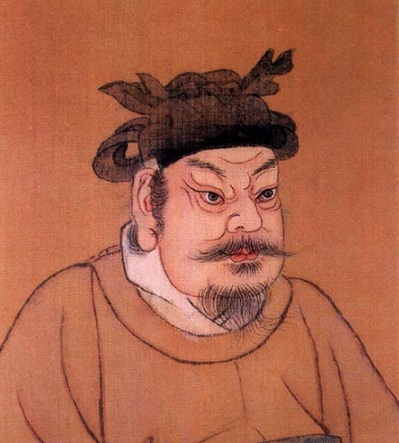
Let’s see which characters this chengyu contains:
- 纸 zhǐ – paper, letter, measure word for document;
- 上 shàng – on, on top, upper;
- 谈 tán – to speak, to talk, to converse; and
- 兵 bīng – soldier, army, weapon.
This idiom comes from the Warring States period, where a general named Zhao Kuo (趙括) was skilled in military theory but lacked real battlefield experience. When he was given command in an actual war, he failed disastrously, leading to a major defeat.
In fact, Zhao lost just under half a million men in a month and a half!
Example Sentences
要成功就要付诸行动, 只靠 纸上谈兵是不行 的。
You must act if you want to succeed. It is no use to be an armchair strategist.别总是纸上谈兵。
Don’t always indulge in empty talk.
Complete Guide to Getting a Traditional Chinese Massage
One of the best ways to relax is to go get a traditional Chinese massage! Massages in China are common, and there are a lot of spas that provide them.
Chinese Idiom 3: 凿壁偷光 Dig a Hole in the Wall
凿壁偷光 (záo bì tōu guāng) literally means “to chisel a hole in the wall to steal light.”
- 凿 (záo) – to chisel
- 壁 (bì) – wall
- 偷 (tōu) – to steal
- 光 (guāng) – light
This idiom comes from the story of 匡衡 (Kuāng Héng), a poor but determined boy in ancient China who wanted to pass the imperial exams selecting court officials. Since he couldn’t afford a lamp, he carved a hole in the wall to use the light from his neighbor’s house to read at night.
Thanks to the light coming through the wall, Kuang Heng studied Confucian texts for years and prepared for the exams. Year by year, he passed each level, impressed the officials, and achieved his dream of becoming an imperial officer.
It is used to describe a strong desire for knowledge and perseverance in difficult circumstances.
Example sentences:
他家境贫寒,但像凿壁偷光的匡衡一样,坚持学习,最终考上了大学。
He came from a poor family, but like Kuang Heng, he persevered in his studies and eventually got into university.现在人们一般用凿壁偷光来形容勤学苦读。
Nowadays people use this chengyu to describe someone who studies or works very hard.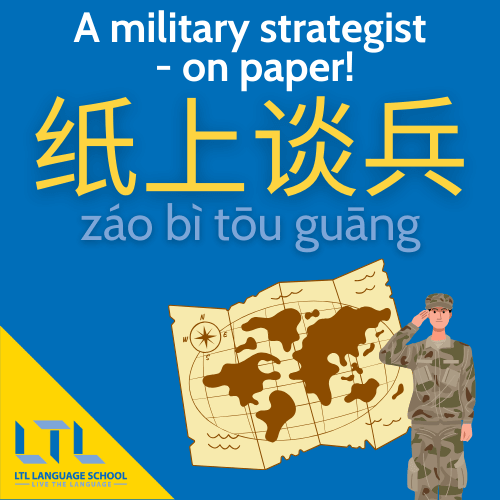
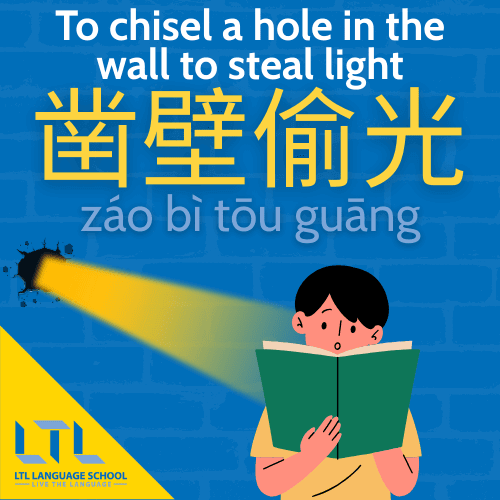
Chinese Idiom 4: 按部就班 – Àn bù jiù bān
按部就班 (àn bù jiù bān) means “to follow the prescribed order” or “to proceed step by step in an orderly manner.”
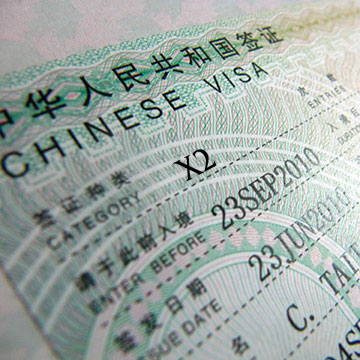
- 按 (àn) – according to
- 部 (bù) – sections or steps
- 就 (jiù) – to follow or conform
- 班 (bān) – order or arrangement
It describes doing things methodically and systematically, without skipping steps. It can be positive, meaning “organized and disciplined,” or negative, meaning “lacking flexibility and creativity.”
This idiom is sometimes used in a critical manner to describe inflexible bureaucracy.
Anyone who has had to apply for a visa in China will be able to relate to this, traipsing from government office to government office to get those all-important red stamps.
Example sentences:
这项工作需要按部就班地完成,不能急于求成。
This task needs to be completed step by step; we can’t rush it.他做事太按部就班,不够灵活。
He does things too rigidly and lacks flexibility.Chinese Idiom 5: 唇亡齿寒 – Chún wáng chǐ hán
唇亡齿寒 (chún wáng chǐ hán) literally means “If the lips are gone, the teeth will feel the cold.”
This idiom describes a close, interdependent relationship where one cannot survive without the other. If one part is lost, the other will suffer as well. It’s similar to the English expression “a shared fate” or “one depends on the other.”
The phrase originates from an ancient story about the State of Wei and the State of Han during the Warring States period. Wei relied on Han for protection, and when Han was conquered, Wei was left vulnerable.
The idiom is often used to describe the relationship between allies, family members, or interconnected systems.
Example sentences:
国家之间的关系就像唇亡齿寒,失去盟友会带来危险。
The relationship between countries is like lips and teeth—losing an ally can bring danger.这两个公司互相依赖,真是唇亡齿寒的关系.
These two companies rely on each other; their relationship is truly interdependent.Chinese Idiom 6: 当机立断 – Dāng jī lì duàn
当机立断 (dāng jī lì duàn) means “to make a prompt decision at a crucial moment.”
- 当机 (dāng jī) – when the opportunity or critical moment arises
- 立断 (lì duàn) – to make an immediate decision
It describes someone who can act decisively without hesitation in important or urgent situations.
Example sentences:
面对危机,他当机立断,迅速采取行动。
Facing the crisis, he acted decisively and took immediate action.
The Complete Guide to Directions in Chinese 🚀 Plus FREE QUIZ
About to go to China? Learning directions in Chinese should be on your priority list. Directions in Chinese will absolutely help you every day in China.
Chinese Idiom 7: 根深蒂固 – Gēn shēn dì gù
根深蒂固 can be translated as “roots are deep and the stem is firm,” meaning something is deeply ingrained and difficult to change.
- 根 (gēn) – root
- 深 (shēn) – deep
- 蒂 (dì) – stem
- 固 (gù) – firm, solid
It can describe deeply rooted habits, beliefs, traditions, or systems. It may have a neutral, positive, or negative connotation, depending on context.
There are still many firmly held beliefs that foreigners do not always understand.
One example is the concept of “filial piety”, the respect and obedience one has for his or her parents.
You can even see adults well into their 30s and 40s defer to their parents. There are several related idioms relating to filial piety, for example: 乌鸟私情 wū niǎo sī qíng – lit. the solicitude of the crow, the meaning is “to provide for your old parents”.
Example sentences:
他的传统观念已经根深蒂固,很难改变。
His traditional views are deeply rooted and hard to change.这家公司在行业里的影响根深蒂固,竞争对手很难撼动。
This company’s influence in the industry is deeply entrenched, making it hard for competitors to shake it.Chinese Idiom 8: 饮水思源 – Yǐn shuǐ sī yuán

Literally, 饮水思源 is “When drinking water, think of its source,” meaning to remember one’s origins and be grateful for past help.
- 饮 (yǐn) – to drink
- 水 (shuǐ) – water
- 思 (sī) – to think of, reflect on
- 源 (yuán) – source, origin
This idiom expresses gratitude and appreciation for those who have helped or supported us.
It is often used to remind people not to forget their roots, benefactors, or past hardships.
Example sentences:
我们要饮水思源,感激那些帮助过我们的人。
We should remember our roots and be grateful to those who have helped us.他成功后仍然饮水思源,回馈母校和家乡。
Even after his success, he remained grateful and gave back to his alma mater and hometown.Chinese Idiom 9 孤掌难鸣 – Gū zhǎng nán míng
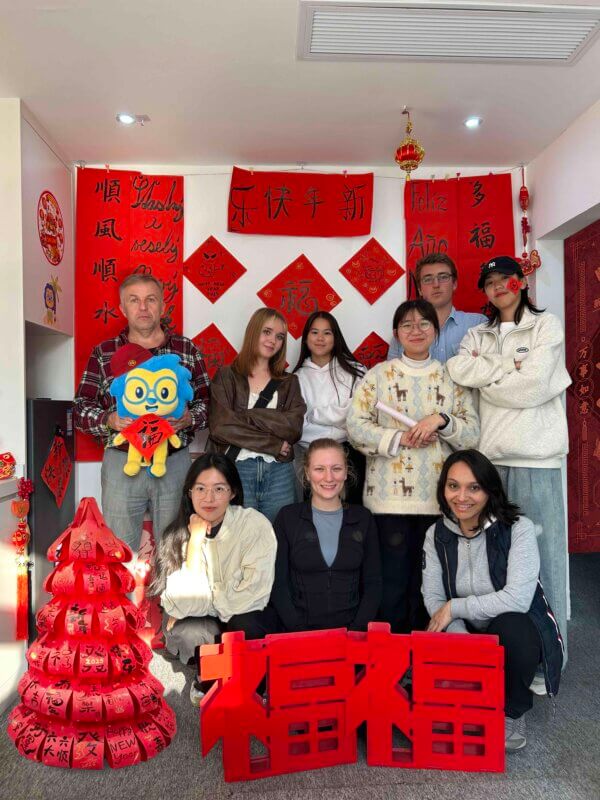
孤掌难鸣 means “A lone hand cannot clap.”
In other words, it is difficult to accomplish things alone; cooperation is necessary.
- 孤 (gū) – lone, solitary
- 掌 (zhǎng) – palm (of the hand)
- 难 (nán) – difficult
- 鸣 (míng) – to make a sound
This idiom emphasizes the importance of teamwork and support.
It suggests that one person alone cannot achieve success without help from others.
孤掌难鸣 illustrates the Chinese mentality that the group is more important than the individual.
Example sentences:
一个人的力量有限,孤掌难鸣,我们需要团队合作。
One person’s strength is limited; a lone hand cannot clap. We need teamwork.改革不是一个人的事情,孤掌难鸣,需要大家共同努力。
Reform is not a one-person task; a lone hand cannot clap. Everyone must work together.Chinese Idiom 10: 络绎不绝 – Luò yì bù jué & 川流不息 – Chuān liú bù xī
络绎不绝 (luò yì bù jué) and 川流不息 (chuān liú bù xī) both refer to flowing movement, but they have slightly different meanings:
✅ 络绎不绝 – Focuses on movement back and forth, in and out, with no clear direction.
✅ 川流不息 – Focuses on continuous movement in one direction, like traffic or a flowing river.
络绎不绝 (luò yì bù jué)
Literally “coming and going continuously without end,” meaning a constant, unbroken flow of people, vehicles, or things.
- 络绎 (luò yì) – continuously, one after another
- 不绝 (bù jué) – unceasing, without stopping
Used to describe a steady stream of people, visitors, customers, etc., moving in and out.
川流不息 (chuān liú bù xī)
Literally “like a river flowing without stopping,” meaning a never-ending stream of people, vehicles, or objects moving in one direction.
- 川 (chuān) – river
- 流 (liú) – to flow
- 不息 (bù xī) – without stopping
Similar to 络绎不绝, but 川流不息 often emphasizes movement in a single direction, like traffic or flowing water.
Example sentences:
节日期间,商场里顾客络绎不绝。
During the holiday season, customers in the mall come in an endless stream.早高峰时,马路上的汽车川流不息。
During rush hour, cars on the road flow continuously like a river.Chinese Idiom 11: 一针见血 – Yī zhēn jiàn xiě
一针见血 (yī zhēn jiàn xiě ) means “a single needle can see the blood,” the Chinese equivalent of hitting the nail on the head or getting straight to the point.
- 一针 (yī zhēn) – one needle
- 见 (jiàn) – to see
- 血 (xiě) – blood
This idiom is used to describe someone who addresses a problem directly, accurately, and with precision—often in a conversation or debate. It highlights the ability to focus on the crux of an issue without beating around the bush.
Here are some examples of when you could use this idiom:
👉 In a debate or discussion: If two people are discussing a complex issue, and one person makes a clear and concise point that solves the problem or reveals the main issue, you could say they made an “一针见血” comment.
👉 In problem-solving: When someone solves a complicated issue quickly by focusing on the most important aspect, their solution can be described as “一针见血.”
Example sentences:
他的一番话真是一针见血,完全抓住了问题的核心。
What he said was really to the point, completely capturing the essence of the problem.在讨论中,她的一针见血让大家意识到问题的根本。
In the discussion, her direct remark made everyone realize the root of the problem.Chapter 12: 九牛一毛 – jiǔ niú yī máo
Literally “one hair from nine cows,” meaning a tiny, insignificant part of a much larger whole. 九牛一毛 describes something that is so small or unimportant that it is practically negligible in comparison to the bigger picture.
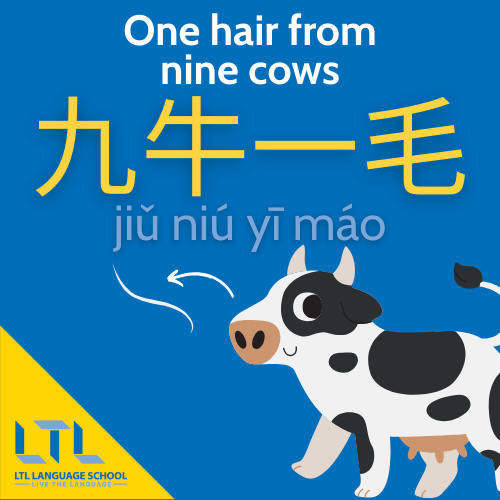
- 九 (jiǔ) – nine
- 牛 (niú) – cows
- 一 (yī) – one
- 毛 (máo) – hair (or fur)
This idiom is often used to express how something small doesn’t matter or how an effort is barely noticeable when compared to a much larger problem or situation.
It’s often used to show the insignificance of a small part when viewed in a broader context.
💧 The English equivalent would be ‘a drop in the ocean’.
For example, if someone donates a small amount of money to a huge cause, it might be described as “九牛一毛,” highlighting that their contribution, while appreciated, is very small compared to the overall need.
Example sentences:
对于一个亿万富翁来说,一百万就像九牛一毛。
For a billionaire, one million is like a hair from nine cows—insignificant.他帮助了我们,但这只是九牛一毛,对我们来说意义不大。
He helped us, but it’s just a small thing in the grand scheme of things, not that significant to us.Chapter 13: 见多识广 – jiàn duō shí guǎng
MEANING – (literal) see many know broad.
见多识广 (jiàn duō shí guǎng) is a Chinese idiom that means “well-informed and experienced” or “knowledgeable and broad-minded.”
- 见多 (jiàn duō) – “to have seen a lot” (i.e., having broad exposure to different experiences)
- 识广 (shí guǎng) – “to have extensive knowledge”
It describes someone who has gained wisdom through experience, travel, and learning, making them insightful and well-versed in many things.
In many cases the older generation, and how they should be listened to as they’ve most likely been through what you are, all before.
Example sentences:
这位教授见多识广,能从多个角度解答学生的问题。
This professor is very knowledgeable and can answer students’ questions from many different perspectives.他是个见多识广的旅行家,去过世界上许多不同的地方。
He is a well-traveled and knowledgeable traveler, having been to many different places around the world.Chapter 14: 万众瞩目 – wàn zhòng zhǔ mù
万众瞩目 translates into “millions of people staring,” which means “the focus of everyone’s attention” or “under the spotlight of many people.” 👁️👁️
- 万 (wàn) – ten thousand (symbolizing a large number)
- 众 (zhòng) – people, crowd
- 瞩目 (zhǔ mù) – to gaze at, to focus one’s attention on
This idiom is used to describe someone or something that is attracting the attention of a large number of people—like being in the public eye or receiving a lot of attention for a particular reason. It’s often used to convey a sense of great significance or excitement surrounding someone or something.
Example sentences:
这个明星的演唱会吸引了万众瞩目,场馆座无虚席。
The singer’s concert attracted the attention of millions, and the venue was completely full.他的发明受到了万众瞩目,大家都在期待它的发布。
His invention garnered the attention of millions, and everyone is looking forward to its release.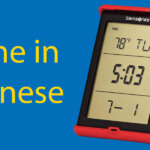
Time in Chinese ⏰ The Complete Guide to Telling the Time in Mandarin
Telling the time in Chinese is a useful and easy thing to learn. We teach you how it’s done along with teaching you days of the week and months of the year.
Chinese Idiom 15: 蒸蒸日上 – Zhēng zhēng rì shàng
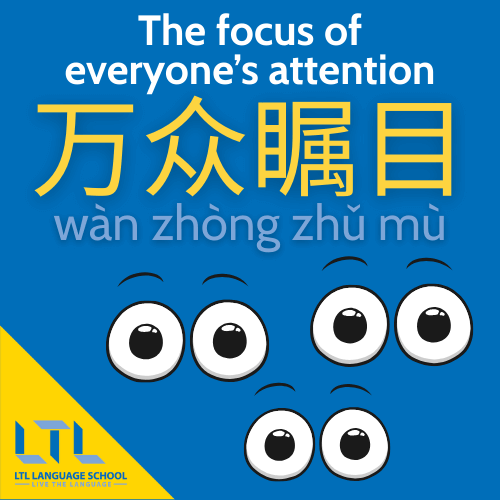
Literally “rising day by day like steam,” 蒸蒸日上 means things are improving continuously and thriving.
- 蒸蒸 (zhēng zhēng) – flourishing, rising (like steam)
- 日 (rì) – day
- 上 (shàng) – upward, rising
This idiom is used to describe steady progress and prosperity in various situations, such as businesses, economies, careers, or even personal development.
It has a positive connotation and suggests continuous improvement.
公司的业务蒸蒸日上,利润也不断增长。
The company’s business is thriving, and profits are continuously growing希望你的事业蒸蒸日上,越来越成功!
I hope your career keeps rising and becomes more and more successful!Related to the above idiom, we also have 日新月异 – rì xīn yuè yì – lit. changes every day and every month. This idiom often crops up when talking about technological advances.
Be Careful with Chinese Idioms and Chengyu
Why?
Because a single character can change everything!
If you’ve studied Chinese, you know how small mistakes—like a wrong tone or missing stroke—can completely alter your meaning. These moments can be embarrassing, but they’re part of the fun of learning.
Even a single character in a Chengyu can shift its meaning drastically. Take a look at these examples:
一日千秋 (Yī rì qiān qiū) – “One day, one thousand autumns.”
Meaning: Sudden, rapid change.
一日千里 (Yī rì qiān lǐ) – “One day, one thousand miles.”
Meaning: Rapid progress.
一日三秋 (Yī rì sān qiū) – “One day, three autumns.”
Meaning: To miss someone deeply.
As you can see, just one character can completely change the meaning. So, always pay attention to your tones and pronunciation!
Want to see this in action? Check out LTL veteran Alex and his friend Hui in an impressive video demonstration!
Chinese Idiom Stories – FAQ’s
What is a Chengyu?
A Chengyu is a four-character Chinese idiom, often with a historical or cultural origin, that expresses a concept or lesson. It’s a condensed way of conveying wisdom, meaning, or advice.
Are Chengyu the same as idioms in English?
While both Chengyu and English idioms convey meanings beyond their literal translations, Chengyu are usually much shorter (four characters) and often come with historical or cultural significance.
Should I learn Chinese Idioms?
Learning Chinese idioms, stories and proverbs is a brilliant way to get into higher level Chinese, and the great thing is, they aren’t that hard to learn and are more about memorizing them.
What does 对牛弹琴 mean?
Literally – Play the lute to a cow. It is used with reference to someone who is offering a treat to an unappreciative audience.
What does 凿壁偷光 mean?
Literally – to dig a hole in the wall to steal light. This Chinese Idiom refers to someone who has the spirit of perseverance in the face of adversity.
What does 纸上谈兵 mean?
When we look at the four characters and their separate meanings, we can see that the meaning of the chengyu is clear – a soldier (strategist, general) merely on paper, a person who does not have any practical experience, or “paper warfare”, hence an “armchair strategist”.
What does 万众瞩目 mean?
万众瞩目 – wàn zhòng zhǔ mù.
This Chengyu is all about capturing the attention of many and the direct translation very much paints this picture which is “ten thousand crowd gaze eyes”.
Want more from LTL?
If you wish to hear more from LTL Mandarin School why not join our mailing list.
We give plenty of handy information on learning Chinese, useful apps to learn the language and everything going on at our LTL schools!
Sign up below and become part of our ever-growing community!


 Hi, my name is Mojca. I am from Slovenia in Europe and I work as a student advisor at our Beihai school.
Hi, my name is Mojca. I am from Slovenia in Europe and I work as a student advisor at our Beihai school.


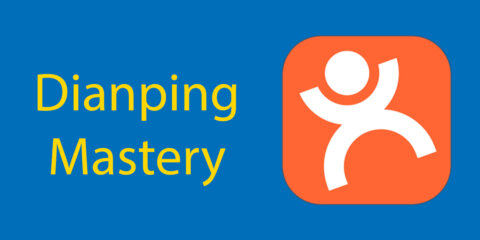





8 comments
[…] The Story Behind the Idiom: 纸上谈兵 Armchair Strategist […]
[…] The Story Behind the Idiom: 纸上谈兵 Armchair Strategist […]
Fascinating list of idioms, thanks for these. Funny how the language works
Thanks for your kind feedback Alan
Great list, love learning these kinds of things with a new language
Idiom's are a lot of fun to learn for sure Gio!
Do Chinese ppl use idioms on a daily basis?
Hi Marice, just like in any language idioms in Chinese are used when the situation fits 😊